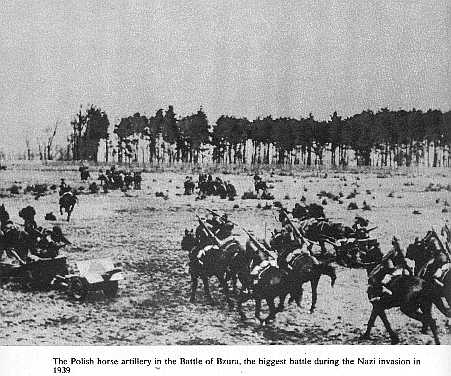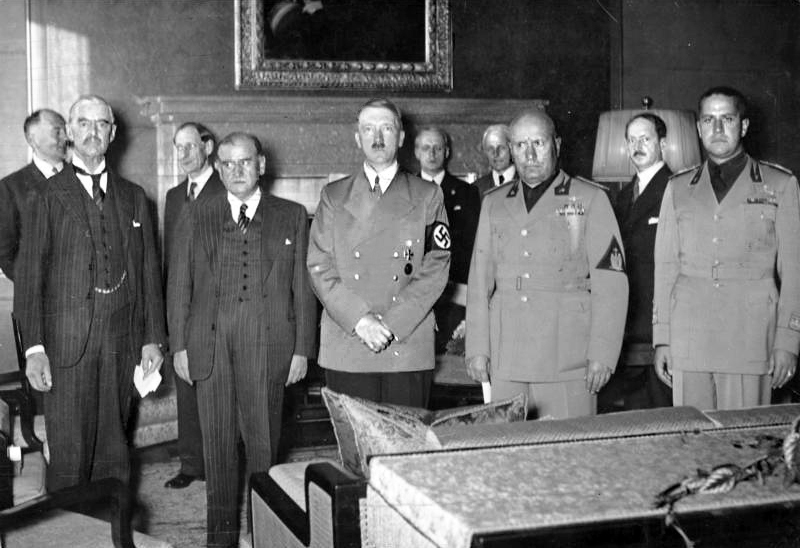World War II began on this day seventy years ago when the Nazis invaded Poland. The fate of Poland was actually set a few days before when Hitler and Stalin agreed to divide the country between them. Communism and fascism are variations of the same totalitarian idea. It really wasn’t as surprising that they could get together as it seemed at the time.
But the roots of the war go back much deeper. We can start with the Treaty of Versailles, which was really unworkable. But nothing is inevitable in history. Had the economies not stagnated and the depression not hit, maybe Germany could have worked out its problems.
Another root of the war was Germany itself. The constitution of the Wiemar Republic was a model of democracy in theory, but its proportional representation, among other things, made it unstable and allowed demagogues like Hitler to leverage power.
A world at war still was not inevitable. During the 1930s, craven politicians in the great democracies appeased Hitler. They feared war so much that they made war more likely and made the devastation more terrible when it came. The simple argument against appeasement is that you just cannot appease dictators. They always demand more. But there is a more deeper one that is implicit but sometimes overlooked. Let’s use the Hitler example.
He was “appeased” several times. Each time it made him hungry for more AND gave him more power to demand more. Germany could not have launched an aggressive war unless it secured its flanks. Imagine if there had been no Anschluss with Austria. Could Hitler have counted on security there? Or what is Czechoslovakia had remained intact? Czechoslovakia had formidable industry and the Sudety Mountains provided defensible terrain. The great democracies just gave that away. First they gave away the mountains (the Sudetenland) in the ostensible name of minority rights. Then they gave away the rest to buy peace. In all these cases, Hitler not only eliminated a threat; he also absorbed the power and got stronger.

The Nazi Germany that launched the war in 1939 was a country on steroids. It had gobbled up Austria and Czechoslovakia, secured Memel, rebuilt and remilitarized.
Critics say the democracies could not have gone to war with Germany earlier, but then they were forced to go to war with a more powerful Germany later, a Germany they had accepted and passively helped build. Had they resisted earlier they would have faced a weaker Germany. Hitler might have backed down short of war and he might have fallen from power if prevented from expanding. We judge the power muscular Germany of 1939 and forget that this monster was transformed from a weakling of only six years earlier with the collaboration of peace-loving leaders in the great democracies.
History is the sum of choices. It is not inevitable and it is not over. We cannot do experiments. We never know what would have happened in different situations. Maybe if the British and French had acted early, maybe it would have meant war earlier, which they probably could have won easier, but then we would be talking about how their belligerence provoked a needless war of choice. More likely, their courage and resolve would have prevented or at least mitigated the conflict.

We Americans were largely out of the equation – by choice. We thought we could just ignore the rest of the world and mind our own business. We were not active appeasers, but we were certainly appeaser enablers.
It has been seventy years since the war began and sixty three years since it ended. We like to gnash our teeth about how bad the world is today, but it is a lot better than it was back in 1939. We have avoided another worldwide conflagration since that time. The depression did not return. The world became more prosperous, tolerant, democratic and connected.
Maybe we did learn something from history and a post-war group of wise men build alliances like NATO and various institutions that preserved the peace, or at least prevented the big war, not through wishful thinking, such as espoused by the League of Nations, but through strength and sometimes blood.
The lesson that history teaches over and over is that peace does not preserve itself. Peace is not the natural state of mankind and freedom has been rare thorough human history. War cannot be banished from the earth. It can be managed and controlled for long periods of time, but only if we recognize its reality and we are willing to pay the price. Freedom can be enjoyed ultimately only by those strong and resolute enough to defend it. The price of liberty truly is eternal vigilance. This is not a pleasant thought, but it is one to keep in mind.
Other approaches are not as successful. Experience shows that excessive search for peace ironically lead to war and those able to defend themselves often do not need to. On July 24, 1929, the world outlawed war. This was the Kellogg-Briand Pact. It passed the U.S. Senate by a margin of 85-1. On September 30, 1938, Neville Chamberlain declared that the Munich Treaty with Hitler was “peace for our time.” Less than a year later … well it didn’t work out the way they hoped.
